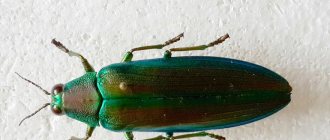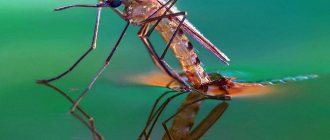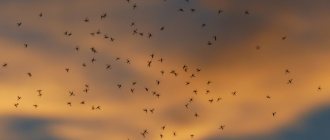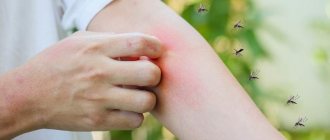Mosquitoes are the most common insects in the world. They are only absent where there are no favorable climatic conditions or where there is no food. Countries and regions where there are no mosquitoes can be counted on one hand. In Russia there are also places where you can relax quietly in nature or not put mosquito nets on the windows.
Wonders of nature
The swamps, so beloved by these insects, occupy about 10% of our country, and this is an area of 1.4 million km2 and even more. This is why every summer we suffer from an invasion of mosquitoes and midges, because we have such excellent conditions for their reproduction. That’s why, when choosing a place where we can take a break from everything at once, we inadvertently think: “Are there a lot of mosquitoes there? Are there any places on our planet where these blood-sucking annoying insects do not live?”
Yes, such places really exist! There are small cities, islands, even entire countries where there are practically no or no mosquitoes at all. Of course, in some cases this is due to climate, and in others – to human activities to combat these parasites, but there are such places. We suffer from mosquitoes every year as soon as they wake up and go out to hunt, so those parts of the world where they are not found can safely be called natural wonders.
American mosquitoes have increased their numbers 10-fold thanks to insecticides
A group of researchers from the United States studied mosquito communities in large cities of the country and came to the conclusion that the explosive growth in the number of these insects in cities is explained by a rather unexpected factor. The corresponding article was published in Nature Communications.
The researchers looked at health officials and biologists' observations of mosquito populations in US cities in New Jersey, California and New York over the past 50 years. It turned out that during this time the number of mosquitoes per unit area there increased 10 times. At the same time, the number of mosquito species living in each of these states has increased by 2–4 times.
To find out the reasons for such a sharp increase in the mosquito population, scientists compared the rate of this growth year by year with average annual temperatures, precipitation and other factors. It turned out that temperatures had little effect on the numbers of these insects. There was little correlation only with precipitation, the level of which increased due to warming over these half-century.
And yet, the most important factor unexpectedly turned out to be DDT, the use of which was banned in the United States back in 1972. Urbanization came in second place in importance: where it was more active, the number of mosquitoes was also greater. Typically, insecticides do not affect insect populations decades after application—they break down fairly quickly under the influence of ultraviolet radiation and other factors.
However, DDT is very effective, including against mosquitoes. At the same time, it takes a long time to decompose, especially in lowlands, where female mosquitoes prefer to lay eggs. So, in fact, mosquito populations in all of these states have only recently begun to emerge from the effects of the drug, traces of which can still be found in several counties in New York State.
Scientists believe that once insects are fully recovered from the effects of DDT, the increase in mosquito numbers will slow down. However, this does not apply to those regions where intensive urbanization is taking place. In cities, mosquitoes receive a powerful and compact food supply - people. In addition, puddles often form on the asphalt for a long time. Together with individual elements of sewer systems, they serve as a good refuge for mosquito larvae.
DDT, or trichloromethyldi(p-chlorophenyl)methane, is an extremely effective insecticide that kills a wide variety of insect species. In the USA, until 1972, about 600 thousand tons were introduced. In the USSR and Russia, application rates were smaller, but limited amounts of DDT were used until the beginning of the 21st century. The main danger of the drug is its ability to accumulate in living organisms and remain there unchanged for a long time. It is believed that it may have a negative effect on the reproductive system of birds.
The drug can also accumulate in the human body. For environmental reasons, it has long been banned in most developed countries of the world. However, WHO recommends its use where there is a risk of malaria. There are no other ways to quickly and inexpensively reduce mosquito populations in developing countries. However, experiments have recently begun in the USA and Brazil to combat mosquitoes using genetically modified males of the corresponding species. The problem of mosquitoes in these countries has become especially acute due to the epidemic of the Zika virus, which causes microcephaly in the children of mothers infected with it.
Where there are no mosquitoes
Perhaps it’s worth starting from the place where it is most difficult to get to, namely Antarctica. Yes, yes, these insects are not found there, so you don’t have to worry about meeting them. The thing is that mosquitoes simply cannot survive in such low temperatures, which reign in Antarctica all year round. But people won’t be particularly comfortable staying in such cold either, so Antarctica is not suitable as a place where you can relax with your family.
In Iceland, these insects are also absent due to the same temperatures. Of course, the climate in this country is much milder than in Antarctica, so frequent changes in air temperature and sudden changes in weather play a role here. In addition, Iceland is more accessible, it is much easier to get there than to the very south of the Earth, and spending your vacation or vacation there is incomparably more pleasant.
But in Singapore and Germany there are no mosquitoes for another reason, namely because they are actively fighting them. Who wants to suffer from the attacks of parasites every summer and then endure their itchy bites? The German authorities decided that no one needed it, and therefore began to actively destroy the insects. For example, along large rivers like the Rhine and Main, biological methods were used to combat larvae, using special bacteria. Now there are almost no mosquitoes left there, which has made life much easier for citizens in the warm season. In Singapore, a country with a hot, humid climate, these insects are destroyed for another reason - mosquitoes there are carriers of dangerous tropical diseases. That's why authorities have declared war on mosquitoes and imposed fines of S$1,000 for those who leave water behind after watering their house ficus trees. Why do this if they are just plants? It's simple: mosquitoes love moisture, such conditions are ideal for their reproduction. However, measures against parasites are not limited to this, since Singapore also uses devices that emit electromagnetic waves that repel and kill mosquitoes, as well as repellents. So Singapore is one of the few places in Asia where there are very few mosquitoes.
Our next stop is the Faroe Islands. This is an autonomous region, part of Denmark, the climate there is temperate maritime, not the same as in Iceland, but there are no mosquitoes either. Scientists say that this is due to the same weather conditions, but they remain silent about which ones.
You won't be able to run into mosquitoes in the mountains yet. Of course, for this the altitude must be at least 1500 meters, otherwise there is no point in going up there. The mountains are free from mosquitoes for the reason that mosquitoes do not fly so high, they love lowlands and warmth, and it is also cold in the mountains.
Otherwise, these blood-sucking nasty insects live almost everywhere. You can stumble upon them in any country in the world except Iceland, in any place if it is not included in the list of rare exceptions. There are a lot of mosquitoes at popular resorts, so it is better to prepare for them in advance and purchase something that will save you from their buzzing company. Even if you didn’t go on vacation somewhere and stayed at home, this does not mean that you are saved from mosquitoes. Of course, if your home is not the same Faroe Islands or Germany. Otherwise, there is no need to endure their attacks - just get rid of them! Ways to do this can be found here. Have a nice holiday!
Mosquitoes in our area
Mosquitoes
Every year, with the onset of warm days, the population of our country thinks about how to protect themselves, their pets and their home from blood-sucking insects. There are no mosquitoes in Russia only in certain regions.
Most mosquitoes in the taiga are carriers of dangerous diseases. The abundance of insects is in the southern regions of the country, where temperature conditions are appropriate. In Moscow we have to fight parasites every year, and pests do not leave people living in St. Petersburg alone. It's all about the swampy area where the largest cities in Russia are located.
- There is no vileness in the central regions of the country.
- The problem does not exist in the Astrakhan region.
- Pests are found only near rivers in Cherepovets.
- In the Tver region there are mosquitoes, but there are no midges.
There are no parasites in the south of the Great Caucasus; they are found to varying degrees in other regions of the country. In Crimea, mosquitoes feel at ease, but there are areas of the peninsula where bloodsuckers are a rare occurrence. According to numerous reviews on forums where this issue is discussed, everything is learned by comparison. Some people think that there are no mosquitoes if they are not found in the apartment, others mean a relaxing holiday in nature.
How an ordinary mosquito helped America gain independence
Over the next 70 years, mosquito control reached new levels. Insecticides such as DDT—introduced in the 1940s—have proven lethal to all mosquitoes (as well as many other creatures). The Aedes aegypti mosquito, due to its affinity for human settlements, has fallen victim to spraying campaigns much faster than most of its brethren. Meanwhile, the fight against the yellow fever mosquito turned out to be too successful. As mosquito populations have plummeted and the risk of yellow fever and dengue has subsided, funding for continued mosquito control efforts has become less pressing. As a result, the corresponding budget on the American continent was reduced. Additionally, the unpleasant side effects of DDT and other insecticides became well known in the 1960s. If the Zika virus had appeared in America in the 1930s or 1950s, it would have faced an unenviable fate - the yellow fever mosquito was then tightly controlled. But since the 1980s, we have seen a sudden return of Aedes aegypti to North and South America. Although the main reason for this phenomenon appears to be a lapse in the fight against mosquitoes, global warming also played a role, due to which the mosquito’s habitat is gradually expanding. Today, the Zika virus has a much higher chance of spreading widely through human populations via the yellow fever mosquito. In addition, Aedes albopictus, another carrier of the virus, which arrived from East Asia in the 1980s, can help him with this. Aedes albopictus has a wider range in the United States than the yellow fever mosquito and could potentially carry the Zika virus to more northern states. Fortunately, it is less effective as a disease vector. Defeating the Zika virus will require aggressive mosquito control, but the emerging political challenges demonstrate the intransigence of the American character, which has been given free rein by mosquitoes and malaria. It's possible that malaria helped the Americans gain the upper hand in the Revolution of 1780-81, but today their descendants guard their freedom and essentially say "don't oppress me" when asked to cover water containers. The slightest attempt to spray pesticides in our democracy is met with immediate resistance. It's possible that a vaccine will oust the Zika virus sooner or later, but until then, every summer will be an opportunity for the virus to run rampant and mosquitoes to make history. John R. McNeil is professor of history at Georgetown University. His book Mosquito Empires: Ecology and War in the Greater Caribbean 1620-1914 won the 2010 Albert Beveridge Award from the American Historical Association.
GI 13 Mosquitoes Why they are not in Europe and how you can get rid of them
Show description From this issue of “idea generator” you will learn how to fight mosquitoes in Europe and how you can fight them.. The article that inspired me for this issue. https://zen.yandex.ru/media/bighead/pochemu-v-evrope-v-otlichii-ot-rossii-net-komarov-5ca4ded35ec13d00b44024fd. I selected facts about mosquitoes here. https://stofactov.rf/28-interesting-facts-about-mosquitoes/. Support the author of the channel. 5469 0700 1084 3049 (Sberbank). Hello. My name is Roman, and I make videos on various interesting topics: science, technology, ecology, human interaction systems, creativity, business ideas, self-realization, self-improvement, just interesting ideas, inventions and all that. The channel has two main formats: Idea Generator and HZ. GI videos in which I take a topic that interests me, an invention, interesting news and develop this idea. I try to bring something of my own and maybe improve it somehow. From the generator you can learn useful and interesting facts, and also get food for thought about how you can make this world a better place. XZ format in which I conduct experiments, experiences and implement my ideas as far as possible. Why XZ yes because the results of my work are unknown even to me, but a negative result is also a result and my experience may be useful to you.
Video taken from the channel: Projects that make the world a better place
There were no snakes
In truth, snakes never lived in Ireland at all. Analysis of fossils on the Emerald Isle found no traces of snakes. Moreover, it is believed that there were none in Britain. Only later did three species finally appear on the islands: the common snake, the viper and the copperhead. How did this happen?
During the Ice Age, England and Ireland were too cold for cold-blooded reptiles, including snakes, to thrive. 10,000 years later, the glaciers had moved and Europe, England and Ireland were connected, opening up opportunities for migration. Many animals moved to Ireland during this period. Among them were brown bears, lynxes and wild boars.
A family psychologist explained what attracts men to plump women
All you need is epoxy, a couple of boards and a day of time: how to make a backlit table
Scientists: thanks to the pandemic, schoolchildren are increasingly choosing science as a career
Then the glaciers began to gradually melt. The crossing between Ireland and Britain existed 8,500 years ago, and the one between Britain and Europe sank 6,500 years ago. So the snakes had a couple thousand extra years to crawl to the continent.
There is no Germany. Part 2
Show description Categorical refusal of services of commercial organizations for natural purposes. right. Affidavit is an oath under oath. If this oath of a living person is not. will be denied point by point within 30 days of receipt. affidavit, and every point in this affidavit is true. the truth of last resort before any court in the world, especially the people's. court.. 1. Part.
. 2. Part.
. 3. Part.
. 4. Part.
. 5. Part.
. 6. Part.
. 7. Part.
. 8. Part.
. 9. Part.
. 10. Part.
. 11. Part.
. 12. Part.
. Categorical refusal of services of “state” corporations Affidavit and. etc.. https://yadi.sk/d/AQZmIxh43aSGSC
Video taken from channel: Ivans Bobrovs
There is no Germany. Part 1
Show description Categorical refusal of services of commercial organizations for natural purposes. right. Affidavit is an oath under oath. https://www.smad.berlin/?fbclid=IwAR3xyzfCiJtlxLSFhVNkky89qHKMYMYoK6QREzRNFCzAXQ9SQQUC78_8LQ4 If this oath of a living person is not. will be denied point by point within 30 days of receipt. affidavit, and every point in this affidavit is true. the truth of last resort before any court in the world, especially the people's. court.. 1. Part.
. 2. Part.
. 3. Part.
. 4. Part.
. 5. Part.
. 6. Part.
. 7. Part.
. 8. Part.
. 9. Part.
. 10. Part.
. 11. Part.
. 12. Part.
. Categorical refusal of services of “state” corporations Affidavit and. etc.. https://yadi.sk/d/AQZmIxh43aSGSC
Video taken from channel: Ivans Bobrovs
A beggar was lynched in Irkutsk Russia 24
Show description The beating of a professional beggar was filmed in Irkutsk. He was flogged with a belt by his deceived benefactor. He gave me some money for the trip home, and when I met him again, he was indignant and started taking harsh educational measures. Who knows, what if something similar awaits the so-called “beggars for an Audi”. These are two decently dressed girls in a car who are begging for money for tow truck services...
Subscribe to the Russia24 channel: https://www.youtube.com/c/russia24tv?sub_confirmation=1. . .
Latest news from Russia and the world, politics, economics, business, exchange rates, culture, technology, sports, interviews, special reports, incidents and much more... .
Official YouTube channel of VGTRK..
Russia 24 is the only Russian information channel broadcasting 24 hours a day. World news and news from Russian regions. Economic analytics and interviews with influential people... .
See also:
60 minutes https://www.youtube.com/channel/UCR16nHT1nkmG7g9AkE9tGeQ?sub_confirmation=1.
News live https://www.youtube.com/playlist?list=PLLHjKKyQ4OaQ73BA1ECZR916u5EI6DnEE.
International review https://www.youtube.com/playlist?list=PLLHjKKyQ4OaSEmz_g88P4pjTgoDzVwfP7.
Special report https://www.youtube.com/playlist?list=PLLHjKKyQ4OaQLdG0uLyM27FhyBi6J0Ikf.
Interview https://www.youtube.com/playlist?list=PLLHjKKyQ4OaReDfS4-5gJqluKn-BGo3Js.
Reply https://www.youtube.com/playlist?list=PLLHjKKyQ4OaQHbPaRzLi35yWWs5EUnvOs.
Facts https://www.youtube.com/playlist?list=PLLHjKKyQ4OaR4eBu2aWmjknIzXn2hPX4c.
Opinion https://www.youtube.com/playlist?list=PLLHjKKyQ4OaST71OImm-f_kc-4G9pJtSG.
Agitprop https://www.youtube.com/playlist?list=PLLHjKKyQ4OaTDGsEdC72F1lI1twaLfu9c.
Russia and the world in numbers https://www.youtube.com/playlist?list=PLLHjKKyQ4OaRx4uhDdyX5NhSy5aeTMcc4.
News on Saturday with Brilev https://www.youtube.com/playlist?list=PL6MnxjOjSRsQAPpOhH0l_GTegWckbTIB4.
News of the week with Kiselev https://www.youtube.com/playlist?list=PLLHjKKyQ4OaTpipoWQNR1ya5zp19Gc4ZB.
Special Correspondent https://www.youtube.com/playlist?list=PLDsFlvSBdSWfD19Ygi5fQADrrc4ICefyG.
Sunday evening with Solovyov https://www.youtube.com/playlist?list=PLwJvP0lZee7zYMGBmzUqNn16P71vHzgkU
Video taken from channel: Russia 24
Regional affiliation
Mosquitoes inhabit various countries and regions, located in open areas with a warm and humid climate.
The mosquito is perhaps the only insect in the world that lives in any country and on any continent (except Antarctica). Russia is no exception - bloodsuckers plague beach lovers in every corner of our vast Motherland. There are mosquitoes in Crimea, Sochi, Anapa, and on the beaches in the Moscow region. They live in large numbers near rivers, swamps and stagnant bodies of water, so residents of Moscow and St. Petersburg are also susceptible to mosquito attacks.
However, it will also not be possible to hide from bloodsuckers abroad: mosquitoes “unfolded” vigorous activity in Greece, Cyprus, Abkhazia, Turkey - at all the resorts beloved by Russians.
Therefore, when going on vacation, do not forget about safety, because blood-sucking insects are known carriers of dangerous diseases.











